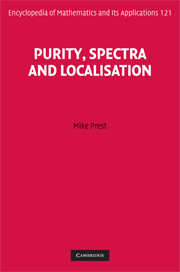Book contents
- Frontmatter
- Contents
- Preface
- Introduction
- Part I Modules
- Part II Functors
- 10 Finitely presented functors
- 11 Serre subcategories and localisation
- 12 The Ziegler spectrum and injective functors
- 13 Dimensions
- 14 The Zariski spectrum and the sheaf of definable scalars
- 15 Artin algebras
- 16 Finitely accessible and presentable additive categories
- 17 Spectra of triangulated categories
- Appendix B Languages for definable categories
- Appendix C A model theory/functor category dictionary
- Part III Definable categories
- Appendix D Model theory of modules: an update
- Appendix E Some definitions
- Main examples
- Bibliography
- Index
16 - Finitely accessible and presentable additive categories
from Part II - Functors
Published online by Cambridge University Press: 05 March 2013
- Frontmatter
- Contents
- Preface
- Introduction
- Part I Modules
- Part II Functors
- 10 Finitely presented functors
- 11 Serre subcategories and localisation
- 12 The Ziegler spectrum and injective functors
- 13 Dimensions
- 14 The Zariski spectrum and the sheaf of definable scalars
- 15 Artin algebras
- 16 Finitely accessible and presentable additive categories
- 17 Spectra of triangulated categories
- Appendix B Languages for definable categories
- Appendix C A model theory/functor category dictionary
- Part III Definable categories
- Appendix D Model theory of modules: an update
- Appendix E Some definitions
- Main examples
- Bibliography
- Index
Summary
This book began with categories of modules but almost everything works in the more general context of locally finitely presented abelian categories. This broader applicability is illustrated by categories of sheaves and by categories subgenerated by modules. In both contexts conditions are given under which such a category is locally finitely presented. Finitely accessible categories give a yet more general context. Dual and conjugate categories are defined.
Finitely accessible additive categories
Section 16.1.1 gives the representation of finitely accessible additive categories as categories of flat functors as well as refinements of this. Purity in finitely accessible additive categories is described in Section 16.1.2. Two different notions of “dual” of a finitely accessible additive category are given in Section 16.1.3 and their equivalence under coherence assumptions noted.
Representation of finitely accessible additive categories
This section, which mostly summarises results rather than giving their proofs, is based on [516]. More details can be found there and in the original references.
The context, that of finitely accessible categories, is set up. Flat objects are described (16.1.2) and finitely accessible additive categories characterised as the flat functors on their finitely presented objects (16.1.3). Conditions on the category of finitely presented objects which are equivalent to “finiteness” conditions on the additive category are stated (16.1.4).
Information
- Type
- Chapter
- Information
- Purity, Spectra and Localisation , pp. 603 - 629Publisher: Cambridge University PressPrint publication year: 2009
